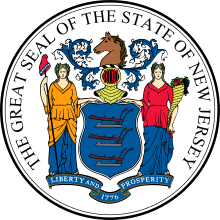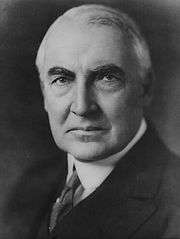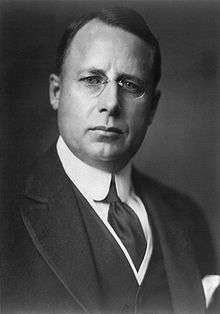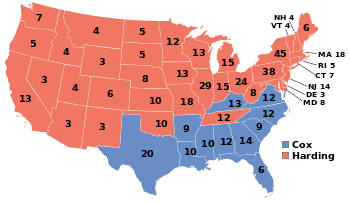United States presidential election in New Jersey, 1920
| | ||||||||||||||||||||||||||||||||
| ||||||||||||||||||||||||||||||||
| ||||||||||||||||||||||||||||||||
|
| ||||||||||||||||||||||||||||||||
| County Results
Harding—50-60%
Harding—60-70%
Harding—70-80% | ||||||||||||||||||||||||||||||||
| ||||||||||||||||||||||||||||||||
The 1920 United States presidential election in New Jersey took place on November 2, 1920. All contemporary 48 states, were part of the 1920 United States presidential election. New Jersey voters chose 14 electors to the Electoral College, which selected the President and Vice President.
New Jersey was won in a landslide by the Republican nominees, Senator Warren G. Harding of Ohio and his running mate Governor Calvin Coolidge of Massachusetts. Harding and Coolidge defeated the Democratic nominees, Governor James M. Cox of Ohio and his running mate Assistant Secretary of the Navy Franklin D. Roosevelt of New York.
Also running that year was Socialist candidate Eugene V. Debs of Indiana and his running mate Seymour Stedman of Illinois.
Harding carried New Jersey overwhelmingly with 67.65% of the vote to Cox's 28.42%, a victory margin of 39.23%. [1]
Debs finished in a distant but fairly solid, for a third party candidate, third with 3.00%.
Like much of the Northeast, New Jersey in this era was a staunchly Republican state, having not given a majority of the vote to a Democratic presidential candidate since 1892. In 1912, Woodrow Wilson, then the sitting Governor of New Jersey, won the state's electoral votes, but with a plurality of only 41% in a 3-way race against a split Republican field, with former Republican President Theodore Roosevelt running as a third party candidate against incumbent Republican President William Howard Taft. But in 1916, Wilson lost the state to the GOP by a decisive 12-point margin in a head-to-head match-up.
With the deeply unpopular Democratic administration of Woodrow Wilson as the backdrop for the 1920 campaign, Warren G. Harding promised a "return to normalcy" that appealed to many voters, while Cox was tied to the policies of the Wilson administration. Harding won nationally in one of the most decisive landslides in American history, and New Jersey, already a fiercely Republican state, went even harder for Harding than the nation, making New Jersey a solid 13% more Republican than the national average.
On the county level map, reflecting the decisiveness of his victory, Harding swept all 21 of New Jersey's counties. Harding broke 60% of the vote in 17 of them and broke 70% of the vote in 9 of those.
The elections of 1920 and 1924 would prove to be the Republican Party's high mark in the state of New Jersey, the culmination of an era of Republican dominance in the state beginning in 1896. By 1928, the state would begin trending Democratic when the Democratic Party nominated Al Smith, a New York City native and Roman Catholic of Irish, Italian and German immigrant heritage who appealed greatly to urban New Jersey voters, and beginning in 1932, the state would vote Democratic in all four of Democrat Franklin Roosevelt's elections with the rise of the New Deal Coalition in the state.
| Elections in New Jersey | ||||||||
|---|---|---|---|---|---|---|---|---|
 | ||||||||
|
||||||||
|
||||||||
Results
| United States presidential election in New Jersey, 1920 | |||||
|---|---|---|---|---|---|
| Party | Candidate | Votes | Percentage | Electoral votes | |
| Republican | Warren G. Harding | 611,541 | 67.65% | 14 | |
| Democratic | James M. Cox | 256,887 | 28.42% | 0 | |
| Socialist | Eugene V. Debs | 27,141 | 3.00% | 0 | |
| Prohibition | Aaron S. Watkins | 4,734 | 0.52% | 0 | |
| Farmer-Labor | Parley P. Christensen | 2,200 | 0.24% | 0 | |
| Socialist Labor | William Wesley Cox | 923 | 0.10% | 0 | |
| Single Tax | Robert Macauley | 517 | 0.06% | 0 | |
| Totals | 903,943 | 100.0% | 14 | ||
See also
References
- ↑ "1920 Presidential General Election Results - New Jersey". Dave Leip's Atlas of U.S. Presidential Elections. Retrieved 5 February 2014.
Template:United States elections, 1920



